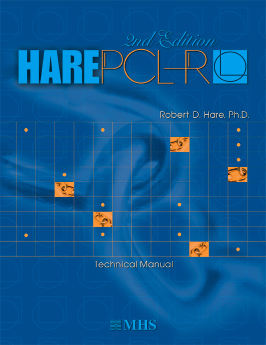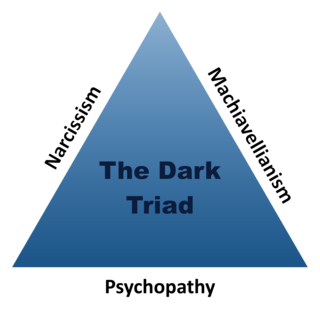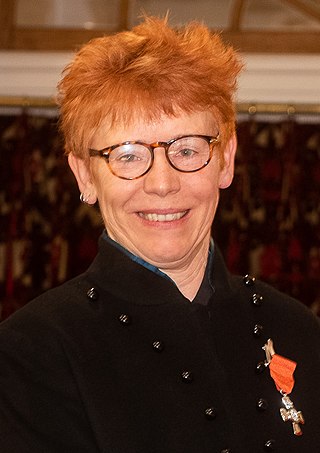Related Research Articles
Antisocial personality disorder, often abbreviated to ASPD, is a mental disorder defined by a chronic pattern of behavior that disregards the rights and well-being of others. People with ASPD often exhibit behavior that conflicts with social norms, leading to issues with interpersonal relationships, employment, and legal matters. The condition generally manifests in childhood or early adolescence, with a high rate of associated conduct problems and a tendency for symptoms to peak in late adolescence and early adulthood.

The Association for Psychological Science (APS), previously the American Psychological Society, is an international non-profit organization whose mission is to promote, protect, and advance the interests of scientifically oriented psychology in research, application, teaching, and the improvement of human welfare. APS publishes several journals, holds an annual meeting, disseminates psychological science research findings to the general public, and works with policymakers to strengthen support for scientific psychology.
Robert D. Hare is a Canadian forensic psychologist, known for his research in the field of criminal psychology. He is a professor emeritus of the University of British Columbia where he specializes in psychopathology and psychophysiology.
Psychopathy, or psychopathic personality, is a personality construct characterized by impaired empathy and remorse, in combination with traits of boldness, disinhibition, and egocentrism. These traits are often masked by superficial charm and immunity to stress, which create an outward appearance of apparent normalcy.

The Psychopathy Checklist or Hare Psychopathy Checklist-Revised, now the Psychopathy Checklist—revised (PCL-R), is a psychological assessment tool that is commonly used to assess the presence and extent of psychopathy in individuals—most often those institutionalized in the criminal justice system—and to differentiate those high in this trait from those with antisocial personality disorder, a related diagnosable disorder. It is a 20-item inventory of perceived personality traits and recorded behaviors, intended to be completed on the basis of a semi-structured interview along with a review of "collateral information" such as official records. The psychopath tends to display a constellation or combination of high narcissistic, borderline, and antisocial personality disorder traits, which includes superficial charm, charisma/attractiveness, sexual seductiveness and promiscuity, affective instability, suicidality, lack of empathy, feelings of emptiness, self-harm, and splitting. In addition, sadistic and paranoid traits are usually also present.

The dark triad is a psychological theory of personality, first published by Delroy L. Paulhus and Kevin M. Williams in 2002, that describes three notably offensive, but non-pathological personality types: Machiavellianism, sub-clinical narcissism, and sub-clinical psychopathy. Each of these personality types is called dark because each is considered to contain malevolent qualities.
In psychology, grandiosity is a sense of superiority, uniqueness, or invulnerability that is unrealistic and not based on personal capability. It may be expressed by exaggerated beliefs regarding one's abilities, the belief that few other people have anything in common with oneself, and that one can only be understood by a few, very special people. The personality trait of grandiosity is principally associated with narcissistic personality disorder (NPD), but also is a feature in the occurrence and expression of antisocial personality disorder, and the manic and hypomanic episodes of bipolar disorder.

Christopher Ray Johnson is an American computer scientist. He is a distinguished professor of computer science at the University of Utah, and founding director of the Scientific Computing and Imaging Institute (SCI). His research interests are in the areas of scientific computing and scientific visualization.

The Psychopath Test: A Journey Through the Madness Industry is a 2011 book written by British author Jon Ronson in which he explores the concept of psychopathy, along with the broader mental health "industry" including mental health professionals and the mass media. It spent the whole of 2012 on United Kingdom bestseller lists and ten weeks on The New York Times Best Seller list.
The Psychopathic Personality Inventory (PPI-Revised) is a personality test for traits associated with psychopathy in adults. The PPI was developed by Scott Lilienfeld and Brian Andrews to assess these traits in non-criminal populations, though it is still used in clinical populations as well. In contrast to other psychopathy measures, such as the Hare Psychopathy Checklist (PCL), the PPI is a self-report scale, rather than an interview-based assessment. It is intended to comprehensively index psychopathic personality traits without assuming particular links to anti-social or criminal behaviors. It also includes measures to detect impression management or careless responding.
Callous-unemotional traits (CU) are distinguished by a persistent pattern of behavior that reflects a disregard for others, and also a lack of empathy and generally deficient affect. The interplay between genetic and environmental risk factors may play a role in the expression of these traits as a conduct disorder (CD). While originally conceived as a means of measuring the affective features of psychopathy in children, measures of CU have been validated in university samples and adults.

Devon Leigh Logan Polaschek is a New Zealand professor of psychology and of Crime Science at the University of Waikato in New Zealand who studies high-risk violent offenders in prisons and on parole.
The Nyholm Prize for Education commemorates the life and work of Australian-born chemist Sir Ronald Nyholm, who – alongside his research in coordination chemistry – passionately campaigned for the improvement of science education. He acted as president of the Royal Society of Chemistry from 1968 to 1970.
Robert Frank Krueger is Hathaway Distinguished Professor of Clinical Psychology and Distinguished McKnight University Professor in the Department of Psychology at the University of Minnesota. He is known for his research on personality psychology, clinical psychology, quantitative psychology, developmental psychology, personality disorders, behavioral genetics, and psychopathology. He is the co-editor-in-chief of the Journal of Personality Disorders.
The Association for Research in Personality is an American learned society dedicated to advancing research into personality. Its mission statement does not mention specific disciplines such as social psychology or policy research, instead simply emphasizing the scientific study of personality. It was established in 2001, with David Watson as the founding president. It originally held an annual preconference before the Society for Personality and Social Psychology's annual conference. In 2009, the ARP began holding its own annual conference.
Paul Joseph Frick is an American psychologist and the Roy Crumpler Memorial Chair in psychology at Louisiana State University (LSU), as well as a professor at the Learning Sciences Institute of Australia at Australian Catholic University. He is known for his research on psychopathy and antisocial behavior in children, which he has been studying for over twenty years.

In the field of personality psychology, Machiavellianism is the name of a personality trait construct characterized by interpersonal manipulation, indifference to morality, lack of empathy, and a calculated focus on self-interest. Psychologists Richard Christie and Florence L. Geis created the construct and named it after Niccolò Machiavelli, as they used truncated and edited statements similar to his writing style to study variations in human behaviors. The construct's relation to the thinker himself is exclusively nominal. Their Mach IV test, a 20-question, Likert-scale personality survey, became the standard self-assessment tool and scale of the Machiavellianism construct. Those who score high on the scale are more likely to have a high level of manipulativeness, deceitfulness and a cynical, unemotional temperament.
Christopher J. Patrick is a Canadian psychologist. He is Distinguished Research Professor and Director of Clinical Training in the Department of Psychology at Florida State University. He is noted for his research on psychopathy, and he formulated the triarchic model of psychopathy, which he first described in 2009. He is a past president of both the Society for Psychophysiological Research and the Society for the Scientific Study of Psychopathy. In 2013, he received the Lifetime Scientific Career Contribution Award from the Society for the Scientific Study of Psychopathy.
The influence of childhood trauma on the development of psychopathy in adulthood remains an active research question. According to Hervey M. Cleckley, a psychopathic person is someone who is able to imitate a normal functioning person, while masking or concealing their lack of internal personality structure. This results in an internal disorder with recurrent deliberate and detrimental conduct. Despite presenting themselves as serious, bright, and charming, psychopathic people are unable to experience true emotions. Robert Hare's two factor model and Christopher Patrick's triarchic model have both been developed to better understand psychopathy; however, whether the root cause is primarily environmental or primarily genetic is still in question.
Neurorealism is a concept within popular science where individuals ascribe more meaning to psychological phenomena merely because it is backed up by brain research, including brain imaging methods.
References
- ↑ "FAQ". Society for the Scientific Study of Psychopathy. Archived from the original on 2018-05-27. Retrieved 2018-05-26.
- ↑ "Conferences". Society for the Scientific Study of Psychopathy. Archived from the original on 2018-05-27. Retrieved 2018-05-26.
- ↑ Pescosolido, Bernice A.; Martin, Jack K.; McLeod, Jane D.; Rogers, Anne (2010-12-17). Handbook of the Sociology of Health, Illness, and Healing: A Blueprint for the 21st Century. Springer Science & Business Media. p. 143. ISBN 9781441972613.
- ↑ "Welcome to SSSP - Society for the Scientific Study of Psychopathy". Society for the Scientific Study of Psychopathy. Archived from the original on 2018-05-27. Retrieved 2018-05-26.
The President of the Society for the Scientific Study of Psychopathy is Dr. Adelle Forth
- ↑ Häkkänen-Nyholm, Helinä; Nyholm, Jan-Olof (2012-04-09). Psychopathy and Law: A Practitioner's Guide. John Wiley & Sons. pp. xv. ISBN 9780470972380.
- ↑ "Paul Frick CV" (PDF). p. 26. Retrieved 2018-05-26.
- ↑ "David S. Kosson, PhD". Rosalind Franklin University. Retrieved 2018-05-26.
- ↑ Skeem, J. L.; Polaschek, D. L.; Patrick, C. J.; Lilienfeld, S. O. (2013-11-04). "SSSP Provides Opportunities for Psychopathy Researchers". Psychological Science in the Public Interest. 12 (3): 95–162. doi:10.1177/1529100611426706. PMID 26167886. S2CID 8521465 . Retrieved 2018-05-26.
- ↑ Patrick, Christopher J. (2018-04-23). Handbook of Psychopathy, Second Edition. Guilford Publications. pp. vii. ISBN 9781462535170.